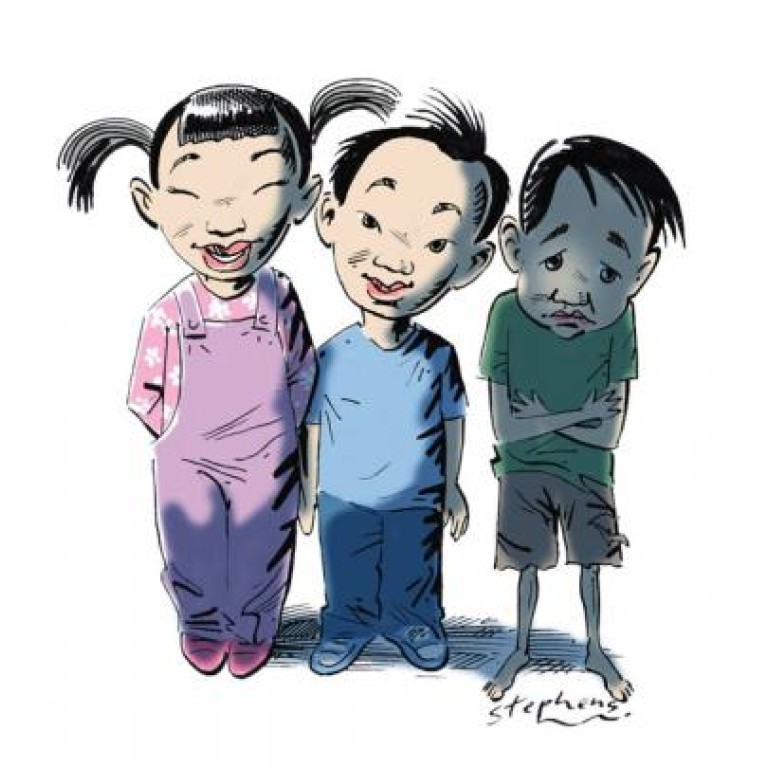
Time for a Hong Kong children's commission
Grenville Cross welcomes the Leung administration's focus on fighting poverty and says that the plight of children, as society's most vulnerable members, must be made a priority
Although Chief Executive Leung Chun-ying has faced a baptism of fire since taking office, a long overdue focus has at least been placed on the plight of the poor. Significant measures have been announced, including a proposed increase in the old-age allowance, more generous medical vouchers, and financial support for non-governmental organisations involved in building the proposed 3,000 youth hostel units.
Although some people have dismissed such moves as mere gesture politics, Leung's plan to revive the Commission on Poverty, so unwisely scrapped in 2007 by his predecessor, Donald Tsang Yam-kuen, points instead to a deeper commitment to tackling problems at root. Although the commission, which Tung Chee-hwa established in 2005, existed for less than 30 months, it was able to identify measures to prevent and alleviate poverty at all levels, including child poverty.
Tsang's belated recognition, in June, that the success of the affluent had not, as expected, "trickled down" to ease the lot of others, came far too late, and the gap between the rich and the poor, according to the Gini coefficient, is now at its greatest in 30 years. Children, inevitably, have borne the brunt of this, and something must be done.
In 2010, the secretary for labour and welfare, Matthew Cheung Kin-chung, estimated that 838,000 people were living in poverty in 2009, and last year his bureau reported that there were 132,200 children aged below 15 living in households with an income below the average CSSA payment.
After Oxfam Hong Kong interviewed 600 poor households last year with children aged 15 and under across the city, it reported that one in six households faced "high food insecurity", which meant that, because of their financial situation, they frequently suffered from hunger. Moreover, 40 per cent of parents also indicated that their income was insufficient to feed their children a balanced diet, and alarm bells are now ringing.
The Society for Community Organisation recently estimated that some 300,000 children now live in straitened circumstances, which is surely intolerable in one of the world's richest cities. A survey by the organisation discovered that many children have no bed to call their own, and that some children are unable to participate in extra-curricular activities. Earlier this year, the Institute of Education reported that education vouchers for kindergarten children are doing little to help low-income families, as the system limits the choice of schools, and some parents, notwithstanding their entitlement to full fee remission, still have to pay part of the school fees.
A recent Harmony House study has, moreover, revealed increasing complaints of child abuse among Primary One to Primary Four pupils, while the government's own statistics have highlighted worrying levels of child neglect in recent times.
Although the United Nations Convention on the Rights of the Child applies to Hong Kong, its corollary, an independent child commission to advance the interests of children, such as exists in Australia, Canada and Britain, has, like the poverty commission, been thwarted, which is a serious blot on Hong Kong's escutcheon. After all, the convention, which is the UN's most-signed treaty, recognises the child's right to such things as survival, protection, development and participation, and a proactive approach to its implementation is vital if Hong Kong is to satisfy international norms, as legislators have acknowledged.
In 2007, the Legislative Council voted unanimously to support Dr Fernando Cheung Chiu-hung's motion to establish a child commission, which would fulfil international obligations, safeguard child welfare and ensure that the child's perspectives are considered when government policies are framed, but the call went unheeded by the Tsang administration. If Cheung, now a legislator again after a four-year hiatus, will once again take up the cudgels for a child commission, there is every reason to suppose that Leung's administration will, at the very least, hear him out.
The chief executive has showed a welcome concern for the plight of the child, both before his election and since. Recent reports have indicated that, following a meeting last month with children's commissioners from Australia and Norway, Leung has asked his colleagues to study the issue of a child commission further, which is encouraging. After all, Hong Kong already has a youth commission, a women's commission, an equal opportunities commission and an elderly commission, and it is high time for children, as the most vulnerable members of society, to be given their appropriate priority.
England's children's commissioner, Dr Maggie Atkinson, has said that the rights of the child "are not waiting to be earned, they are a given", and, once Hong Kong has established an independent children's commission of its own, a gigantic step will have been taken towards ensuring that children can actually enjoy their rights under the UN convention.
